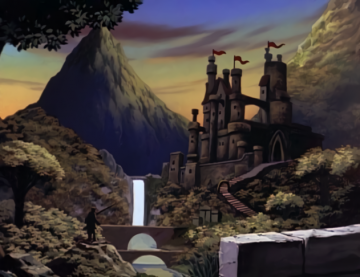Green Knight
The Green Knight is a Child of Oberon, with past connections to King Arthur and his knights.
There is a statue of the Green Knight on Avalon, near Oberon's Palace. [1][2]
Real World Background
The Green Knight appears as a major character in the 14th century Middle English poem, Sir Gawain and the Green Knight. In it, he rides into King Arthur's feasting-hall during its Christmas festivities, in the form of a gigantic green knight astride a green horse, bearing an enormous green battle-axe. He challenges the court to a "beheading-game", offering to submit to a blow to his neck with the axe from any one of Arthur's knights, on the condition that the knight submit to a similar blow himself a year later at the Green Chapel. At first all the knights refuse and the Green Knight questions their courage. Sir Gawain volunteers and beheads the Green Knight with the axe, but the knight merely picks up his head, tells Gawain to remember his vow, and rides out of the hall.
Gawain sets forth to seek the Green Chapel, on a long and perilous journey. He finally comes, during the following Christmas season and as the time for his rendezvous at the Green Chapel is nearing, to a friendly castle whose lord and lady welcome him with fine seasonal hospitality. They tell him that the Green Chapel is close by, but urge him to remain under their roof for the next three days; the lord of the castle proposes a "Christmas game", whereby he will go hunting during those three days while Gawain stays in the castle, and at the end of each day they will give each other whatever they have exchanged during the day; to this, Gawain agrees.
During the next three days, the lord's wife tempts Gawain to engage in an affair with her, but he virtuously refuses her, though also with great courtesy. On the third day, after her efforts to seduce him have once again failed, she offers him a magical green lace, which will protect him from all harm, including the Green Knight's beheading blow. Gawain, remembering that he must face the Green Knight at the Green Chapel the following morning, accepts the lace from her, and keeps it rather than giving it to his host when he returns from the hunt that evening, thus breaking his agreement.
The following morning, Gawain rides out to the Green Chapel, to find the Green Knight there, waiting for him. Gawain kneels before him, and the Green Knight delivers three axe-blows. The first Gawain flinches from; apologizing to the Green Knight, he holds his neck still the following two times. The second blow deliberately misses, and the third blow only grazes the back of Gawain's neck. The Green Knight then reveals that he and the lord of the castle were the same person, and that he was acting as he had done in order to test the virtues of Arthur's court, the lady acting in league with him when she had tempted Gawain as well. Gawain had passed all the tests except for keeping the green lace to himself, which was what the grazing of his neck with the third axe-blow was for, but the Green Knight views this in a forgiving manner, on the grounds that it was only natural for Gawain to wish to live.
Gawain feels ashamed of hiding the lace, however, and is much harder upon himself than the Green Knight is. He returns to Arthur's court and tells the king and his knights the entire story; impressed by his adventures, the other knights vow to henceforth wear belts of green lace in commemoration of Gawain's encounter with the Green Knight.
In the poem, the Green Knight, also named Sir Bercilak de Hautdesert, is portrayed as an agent of Morgana le Fay, which would suggest that in the original story, he was an ordinary human enchanted by her. The interpretation of the tale in the Gargoyles Universe, on the other hand, clearly opts for the Green Knight working under his own magical gifts as one of the Third Race.
See Also
- Green Knight at Wikipedia, the Free Encyclopedia
- Sir Gawain and the Green Knight at Wikipedia, the Free Encyclopedia
